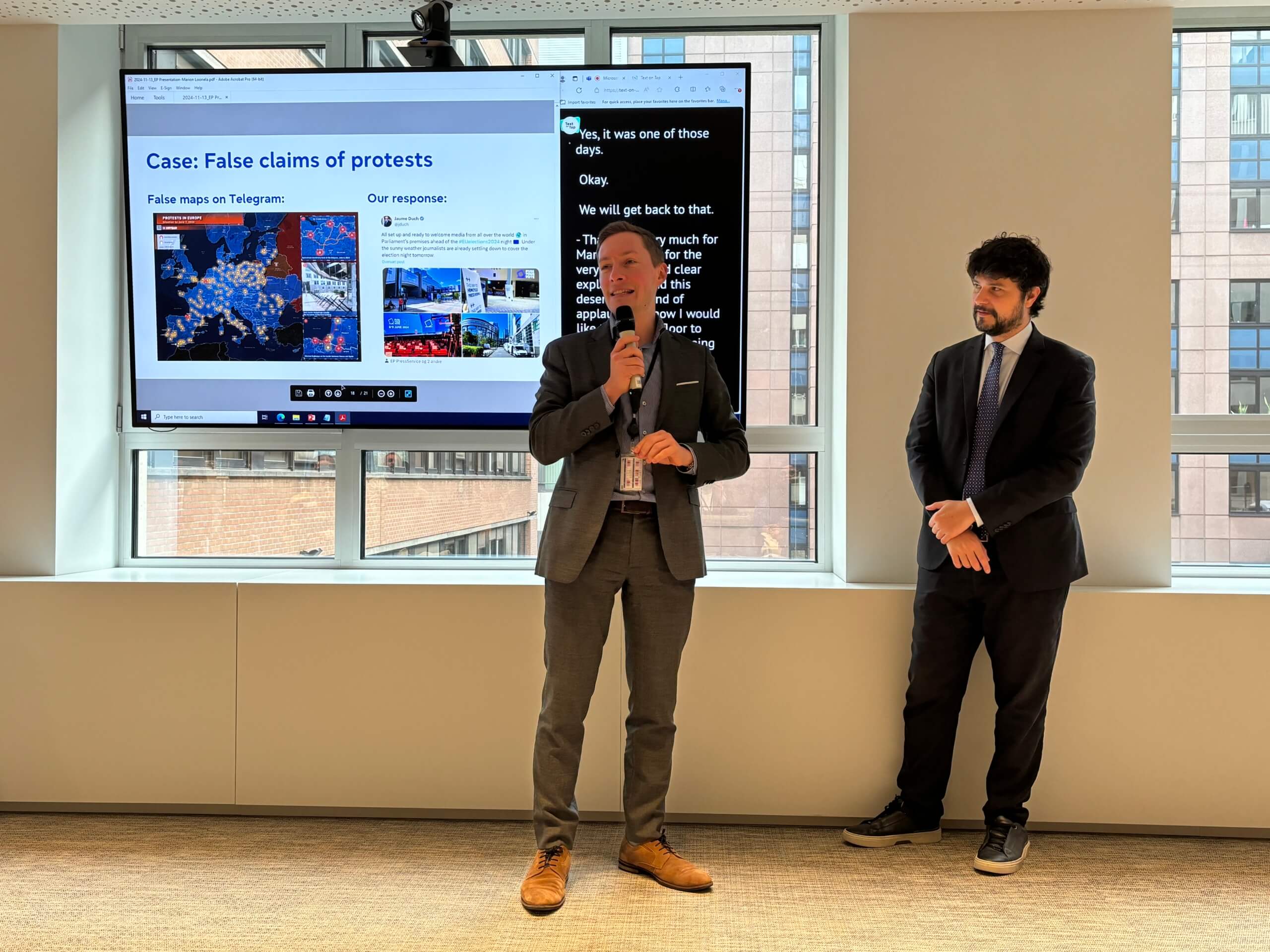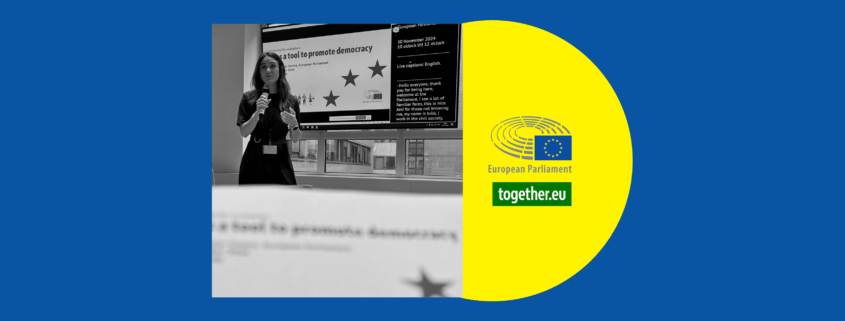CEC European Managers joins European Parliament to shape AI’s role in Democracy
CEC European Managers has been invited today to an event on Artificial Intelligence and democracy as one of the European Parliament’s official communication partners.
Along with the rest of the civil partners and organisations that took part in the Together.eu Multipliers’ Network, managers’ voices were heard at a workshop exploring Artificial Intelligence (AI) as a tool to bolster democratic processes, including MEP Brando Benifei, rapporteur for the AI Act.
Attendees from EU institutions, civic organizations, and advocacy groups convened to discuss AI legislation, communication strategies, and the ethical oversight necessary to ensure AI’s responsible role in democracy.
The Role of Communication Multipliers
Philipp Schulmeister, Director of Campaigns at the European Parliament’s DG COMM, opened the session by emphasizing the crucial partnership through communication networks like Together. eu, stating, “Working with communication multipliers is crucial when disseminating our tasks meaningfully.”
Schulmeister praised the network’s impact, remarking that “Our messages and campaigns have multiplied by eight times in terms of impact since the last campaigns, and this is thanks to your job as multipliers.”
Highlighting the primary focus of the European Parliament, Schulmeister pointed to three essential pillars: legislation, budget allocation, and scrutiny.
The European Parliament messages and campaigns have multiplied by eight times in terms of impact since the last campaigns, and this is thanks to your job as multipliers.
Philipp Schulmeister
Director of Campaigns at the European Parliament’s DG COMM
He anticipated budget allocation to be a key focus in the coming months, especially given the recent Commissioner hearings and the shifting parliamentary majorities that have already affected the debates on EU policies since the previous period.

Addressing AI specifically, he stated, “If we want to build trust on AI, we still have a long way to go,” and emphasized the need for safe, transparent, and human-oversight-oriented AI systems. This position aligns with that of CEC European Managers‘ working group on Digitalisation led by President Maxime Legrand and its position paper.
Legislative Landscape and AI Act: An EU Model
At the event, MEP Brando Benifei, rapporteur for the AI Act, outlined the legislative state of play and discussed the EU’s approach to AI oversight.
He underscored the AI Act’s mission to prioritize human-centric values, explaining, “The AI Act is focused on ensuring only safe AI products can enter the EU market.”
The Act’s high standards distinguish it from regulatory models in other countries that rely on general consumer safety rules.
Benifei explained that in the EU, high-risk AI is determined based on specific use cases to prevent harm and ensure inclusivity.

Notably, the AI Act includes:
- Prohibitions on specific high-risk uses such as biometric surveillance and emotion recognition in schools and workplaces.
- Bias protections, with provisions to mitigate algorithmic discrimination based on socioeconomic, ethnic, or other factors.
- Intellectual property safeguards, ensuring protections for artists and content creators.
Benifei acknowledged that the Act leaves some areas, such as the geopolitical and military applications of AI, unaddressed but expects these issues to be revisited in future legislation. He concluded that the EU’s regulatory model had attracted global interest, emphasizing, “Our EU model of regulation is unique, and many countries outside our borders are taking us as an example.”
The human-centric values of the European approach on Artificial Intelligence are unique, and many countries outside our border are taking us as an example.
MEP Brando Benifei
Rapporteur for the AI Act
Finally, Benifei reflected on the needs of EU citizens and estimated that Europeans are asking for a healthier and well-regulated digital ecosystem, a setting where “everyone feels respected and included” and that can truly work as a valuable network for cooperation, growth, and social cohesion.
Disinformation and AI: A Resilience-Building Approach
Marion Loonela, representing DG COMM’s Spokesperson Unit, discussed AI’s role in combating disinformation, a growing threat to democratic institutions worldwide.
She outlined the EU’s multilayered approach, which includes the Digital Services Act package and Political Ads Regulation (as well as the AI Act), as part of the EU strategy to counter misinformation.
She stressed that, “To fight disinformation, the EU institutions in the public sector are not enough; the private sector is not enough. We need all society coming together.”
Regarding foreign interference, especially from countries like Russia, Loonela described recent election meddling in Moldova as a reminder of the need for a robust civil society, especially in EU candidate countries.
More precisely, the EU’s fight against disinformation combines:
- Pre-bunking: Anticipating and countering false narratives by delivering proactive information.
- Debunking: Correcting misinformation once it has been spread.
- Strategic Silence: Choosing not to respond to certain disinformation to avoid amplifying it further.
The EU Parliament has also developed practical resources to aid citizens, such as a fast-checking toolkit to help citizens spot and counter misinformation.
“The best tool against disinformation is proactive information,” Loonela noted, adding that resilience-building requires “cooperation with multipliers, civil society, and partners much in advance.”
Using AI for Enhanced Communication and Citizen Engagement
A session led by Adrien Duguet and Aline Muylaert (Association Civic Tech Europe) focused on the role of AI in enhancing communication. They emphasized the importance of streamlining messaging through AI to create an inclusive, engaging communication strategy that moves from information to participation, mobilization, and ultimately, contact and engagement.
“AI tools help systematize ideas, allowing for more inclusive, continuous, and strategic conversations,” Muylaert explained. She noted that AI’s potential to simplify complex topics could serve as a bridge for citizen engagement, allowing people to access, understand, and actively participate in democratic processes.
The Association Civic Tech Europe representatives underscored the importance of “listening while building a common ground” in AI dialogues, pointing to AI’s role in fostering strategic, ongoing conversations with citizens.
Q&A and Closing Remarks: Addressing the Double-Edged Nature of AI
The Q&A session with MEP Benifei provided a platform for exploring AI’s complex role in democracy. He addressed questions about mitigating the potential harm of AI algorithms in policy-making, noting the importance of robust oversight and human-centric safeguards.
Benifei remarked on the power dynamics of digital platforms, particularly in light of the Digital Services Act, explaining, “If we act as a single market, there’s nothing they can do, and they should be the ones accepting our rules.” He reiterated that citizens demand digital environment that protects them.
European citizens are asking for a healthy and well-regulated digital environment
MEP Brando Benifei
Rapporteur for the AI Act
CEC European Managers’ participation, represented by Director Olga Molina and Communications Officer Pere Vilanova, fosters EU partnerships to promote democratic engagement.
Since receiving recognition during the 2024 European Elections campaign, CEC European Managers has actively supported EU communications under the theme, Use Your Leadership.

Use Your Leadership – EU Elections campaign for EU Managers
The workshop concluded with a call for ongoing collaboration to ensure that AI serves democracy effectively.
As Schulmeister summarized, “The more we know about AI, the better we will communicate.”




